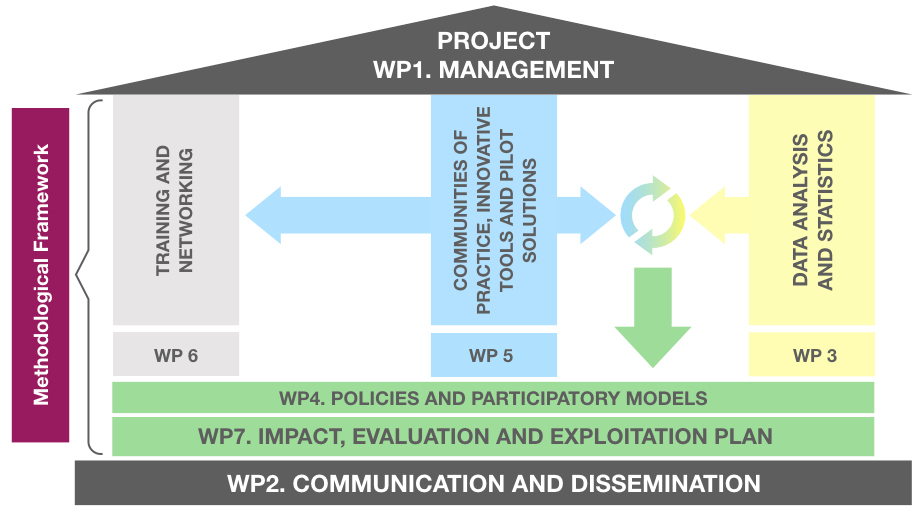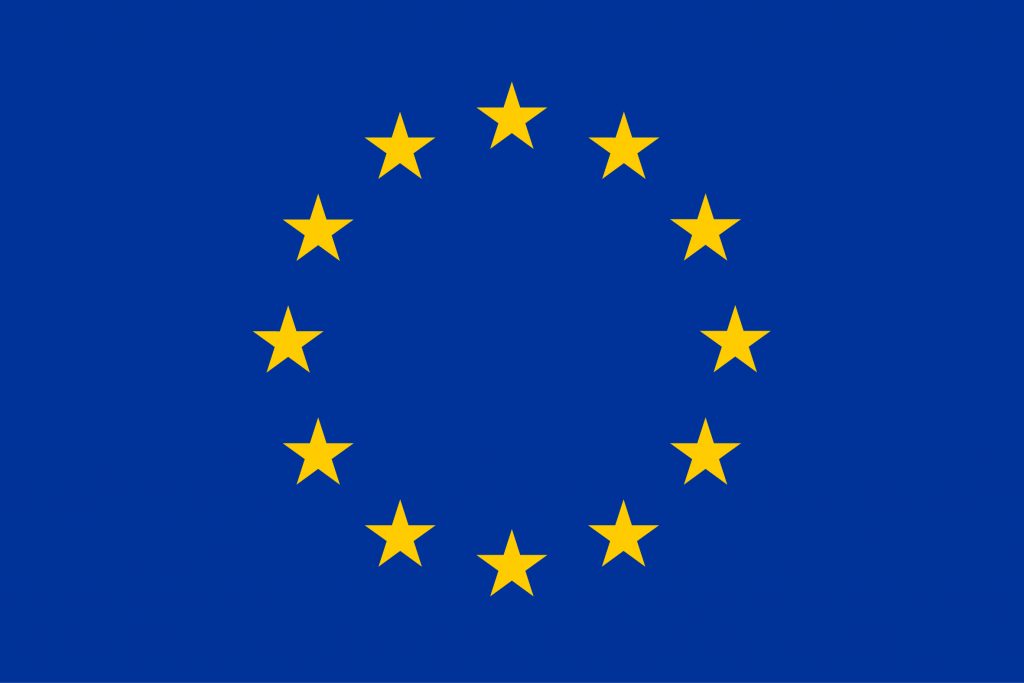
The INCULTUM work plan is structured as 7 Work Packages (WP), linked with the project objectives and both interconnected and partly interdependent, so that the work is based on a solid structure and an effective cooperation between partners.
The project has been structured into two different interconnected scales:
a) The local scale. This level is represented by 10 pilot cases spread across Europe, with different contexts
and focuses that will provide a diversified range of innovations and tools (WP5).
b) The international scale. This level is represented by the following elements:
- Five pilots are conceived as cross-border cases (Portugal, Spain and Italy -Sicily; and Greece and Albania)
- Transversal topics/issues and tasks will make international cooperation and exchange possible through shared protocols for: i) quantitative and qualitative data collection and interviews (WP3); ii) training, networking and experience and tools exchange (WP6); iii) common policy recommendations and strategies (WP4); iv) evaluation, impact and exploitation measures (WP7); v) communication and outreach activities (WP2).
Although pilots will be carried out taking into account local contexts, as it is from a thorough understanding and immersion in the local dimension that INCULTUM is expecting to generate
sustainable forms of innovation, they are not conceived as separate projects, as they will share methodology and resources.
WP1: Project Management
Leader: Jose Maria Martín Civantos, University of Granada
This WP ensures internal coordination and quality control, focus and progress monitoring. Specific objectives are:
- Coordinate and monitor the progress of all project activities;
- Ensure that INCULTUM achieves its objectives within the scheduled time and to the highest standards;
- Stimulate progress and interconnection among all WPs, to ensure timely production of high-quality deliverables;
- Implement an efficient internal workflow to encourage interdisciplinarity;
- Implement procedures to timely identify and overcome issues that can potentially delay or disrupt the project
WP2: Communication and dissemination
Leader: Antonella Fresa, Promoter S.r.l.
This WP aims to establish an effective framework and mechanisms for spreading awareness of project activities and outcomes. Activities include gathering, disseminating and conveying knowledge and experiences produced in the other WPs and in particular in the pilots. Specific objectives of WP2 are to:
- Communicate information and knowledge gathered by the project and make it available to the widest possible audience;
- Disseminate the strategies and pilot solutions elaborated by the project, in order to prepare for further exploitation;
- Create and deliver communication and dissemination support such as the online portal, animation on the social media, promotion of project’s events, posters and brochures;
- Coordinate partner participation in third-party events and publication in scientific journals, promoting INCULTUM strategies and pilot solutions.
WP3: Data analysis and statistics
Leader: Karol Jan Borowiecki, University of Southern Denmark
The WP works to identify, collect and analyse data, according to chosen metrics identified in conjunction with partners responsible for running pilot studies. The collected data are then analysed to explore the mechanisms through which an intervention works on development and with a particular focus on causality. Three approaches to data collection are pursued:
- close monitoring of pilots and wherever possible collection of data before, during and after the intervention;
- collection of official statistics, to be processed from regional and national statistical offices as well as from international sources;
- data are collected from new data sources by making use of creative, digital approaches (e.g. Google Trends, selfdeveloped programs made available by SDU).
WP4: Policies and participatory models
Leader: Alexandra Bitusikova, Matej Bel University
This WP is dedicated to define the key terms of participatory approaches in culture and tourism, based on literature review, knowledge, and experience from empirical studies and research projects, to offer guidance and policy development in the implementation of such participatory approaches for cultural tourism promotion. Specific objectives of WP4 are to:
- Identify different types of participatory models, thereby focusing on positions of the involved actors and the coordination mechanisms that are used predominantly in cultural tourism and re-usable in pilot actions.
- Identify and compare relevant drivers and barriers that account for the success or failure of participatory models.
- Assess the outcomes of participatory models that are based on co-creation of innovative tools in relation to the expected benefits for the involved stakeholders.
- Create and design a Policy Toolbox for Participatory Models in order to reflect drivers and barriers for different participatory models and evaluation framework for their assessment.
- Make policy recommendations leading to synergies between participatory models and innovative tools arrangements.
- Disseminate research results and policy recommendations among involved policy makers, local, re-gional, national and international stakeholders and within the academic community.
WP5: Communities of practice and pilot solutions
Leader: Jose Maria Martín Civantos, University of Granada
This WP coordinates the activities and field work in the selected pilots. It also provides field-specific data for the analysis and statistics (WP3), as well as for policies and participatory models (WP4), Training (WP6) and exploitation (WP7). INCULTUM works have an impact on local communities, which are monitored and surveyed before, during and after the pilot case implementations in terms of improved social cohesion, local identity and life satisfaction in the local communities. The specific objectives are:
- Develop specific innovative pilot cases based on a participatory approach, promoting communities of practices and positive impact in local communities from a social, cultural, environmental and economic point of view.
- Foster bottom-up local strategies for sustainable cultural tourism, focusing on hidden and undervalued potentialities usually not taken into account, and on the experience, learning and participation of visitors.
- Promote cultural tourism based on living territories and communities, avoiding negative impacts of touristification by specific training and reinforcing local identities and social ties.
- Foster the use of innovative approaches by local communities and stakeholders, including the use of ICT.
WP6: Training and networking
Leader: Enrica Lemmi, University of Pisa
The WP aims to provide training and network-qualifying activities at local and international levels, by fostering learning services to local communities and local stakeholders based on a collaborative approach. The aims of the WP are:
- to employ a training and teaching approach to improve pilot coordinators’ understanding of local needs and requirements, and also for local communities and stakeholders to analyse and enhance their own socio-cultural and economic value.
- to promote a local governance teaching programme in order to achieve public participation, community-building and local empowerment towards the cultural tourism sector.
- to carry out digital training at international level, in the form of a webinar to foster cultural heritage knowledge, social awareness of socio-cultural local identity and territorial cohesion in the international framework.
- to organize a final conference in Granada that includes a trainign session to focus on the effective use of ESIF and RIS3 to support sustainable cultural tourism in marginal regions.
WP7: Impact, evaluation and exploitation plan
Leader: Carsten Jacob Humlebæk, Copenhagen Business School
This WP is dedicated to demonstrate the positive impact of INCULTUM innovations at social, cultural, environmental and economic level, basing on the concept that the demand side – i.e. the market for cultural tourism – and the supply side – i.e the local economic and social development – depend on each other. Specific objectives of WP7 are to:
- to develop a detailed stakeholder mapping, with evaluation of the situation ex-ante and ex-post, also fine-graining the plan for results exploitation.
- to study exploitation strategies and activities related to the INCULTUM pilot solutions, their marketability and upscaling.





